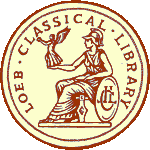Loeb Classical Library Foundation Fellowships

The LCLF application for the 2026–27 academic year will open on August 11, 2025. The submission deadline is November 14, 2025.
Applicants will be notified of the judges’ decision in March 2026.
The Loeb Classical Library Foundation awards fellowships to qualified scholars to support research, publication, and other projects in the area of classical studies. Fellowships will normally range from $1,000 to $40,000.
Fellowships may be used for a wide variety of purposes. Examples include publication subventions, enhancement of sabbaticals, travel to libraries or collections, reasonable payment of student research assistants, conferences, dramatic productions, excavation expenses, and the cost of research materials. Individual fellowship requests may be only partially funded. In exceptional circumstances a fellowship may be extended or renewed, but a new application in must be submitted in a regular application cycle in order to obtain additional funding. A special selection committee will choose the persons to whom fellowships are to be awarded and recommend the amount of the fellowships.
James Loeb directed in his will that income from the Loeb Classical Library beyond that needed for the maintenance and enhancement of the Library eventually should be used "for the encouragement of special research at home and abroad in the province of Archaeology and of Greek and Latin Literature," and that awards should be granted "without distinction as to sex, race, nationality, color or creed."
General Explanation of Funding
- Qualified scholars, including those with faculty emeritus status, are eligible for publication subventions and funding for other costs associated with the publication of research.
- Applicants seeking salary replacement (e.g., for sabbatical enhancement) must have faculty status at a college or university at the time of application and during the entire time covered by the fellowship. They must not have had a full-year funded sabbatical or research fellowship in the three years preceding the academic year for which salary replacement is requested. In the case of applications for salary replacement for 2026-2027, this means 2023/24, 2024/25, 2025/26.
- Applicants seeking funding other than salary replacement (e.g., for archaeological excavations, conferences, travel to collections, etc.) are requested to provide the complete budget for the proposed project in the fellowship period, even if they are requesting only partial funding from the LCLF, and also to list other potential sources of funding and amounts requested.
- Applicants seeking support for projects that take place in the context of a larger project are advised to include a letter of recommendation from the overall project director, explaining how the applicant’s research fits into the larger project’s research and publication plans, and how the expenses requested by the applicant fit into the overall project budget. In general, no more than one application per larger project will be funded.
- Multi-year applications can only be funded for one year at a time. Future applications are welcome, but funding is not guaranteed.
- No more than three consecutive fellowships, or more than three fellowships over any five-year period, will be awarded.
- If receiving salary support, total salary and awards from all sources are not to exceed 100% of grantee's annual salary for 2025–26; if receiving support for other purposes, the total LCLF grant and awards from all sources are not to exceed the grantee’s proposed budget. LCLF awards exceeding these limits will be reduced accordingly.
- Please note that we do NOT cover indirect costs (e.g. insurance, retirement contributions, taxes, etc.; please contact lclf@fas.harvard.edu with specific questions).
- Grants may not be deferred to subsequent academic years.

